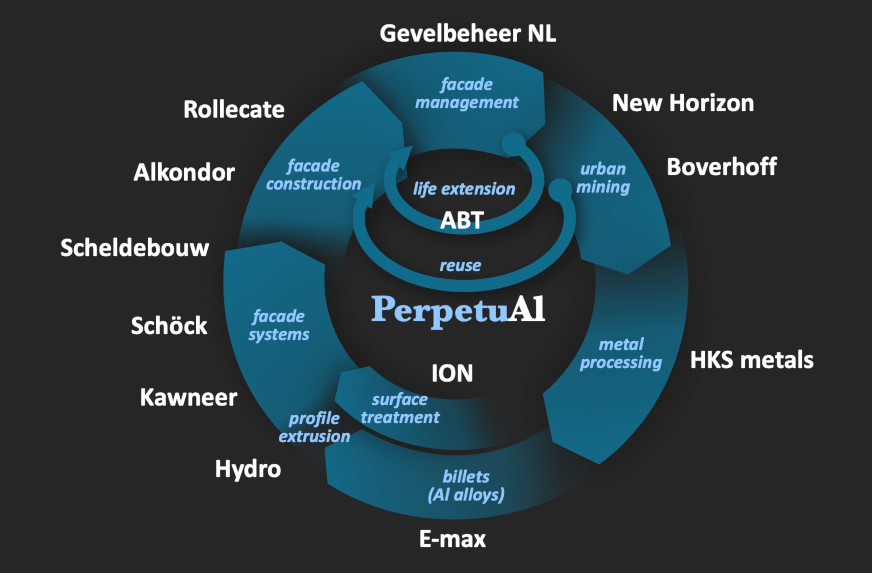

The building and construction sector consumes huge amounts of raw materials that are excavated from the Earth's crust. Buildings that do not meet our needs and standards anymore end up as rubble and are used as landfill. Wouldn't it be smarter to use obsolete buildings as a resource for the production of new buildings? This is the idea behind Circular Building.
Scarcity of materials is not the only motivation to invest in circularity. The conversion of raw materials into useful building components, as well as their demolition at the end of their life, requires also huge amounts of energy.
It is possible to construct new buildings in such a way that materials or components can be reused. But what about the existing building stock? Given the fact that nations have agreed to emit no greenhouse gasses anymore by 2050, and that this amibition requires significant changes of the existing building stock, in the form of better isolation and the replacement of installations for heating, cooling and ventilation, the building and construction community is faced with a huge challenge.
Construction and deconstruction processes have to be reinvented: the life of the existing building stock has to be extended, and components that do not meet our current standards anymore have to be reused as a resource for new building materials.
By closing the material loop, we save not only the materials themselves, but also huge amounts of energy that were otherwise needed for excavation and processing from raw to useful building material.
Athough this circular process will be more environment friendly, it requires a huge transition effort and substantially more labour. One of the key questions is therefore: can we implement this process in such a way that it is not just ecologically, but also economically feasible?
The ambition of CircularBuilding.com is to support industries to implement the new construction and reuse processes in the most cost effective way. We support chains of companies to improve their processes, making use of the principles of Methodic Innovation and Industry 4.0 technology. We develop smart data sharing platforms that optimize the processes in construction and deconstruction projects. Platforms that are accessible and affordable for even the smallest enterprises.
Hence, it makes sense to manufacture new facade elements as much as possible from recycled aluminium. It avoids not only exhaustion of the Earth's natural resources, but the processing (i.e. remelting) of scrap requires only 5% of the energy.
A few facade companies in the Netherlands offer already products that contain more than 70% recycled content. The ambition is to increase this percentage to over 90% within a few years. In theory, aluminium can be recycled infinitely, provided that no contamination with other metals occur. The aluminium industry examines therefore new products and new separation processes that avoid contamination.
Thirteen companies, each playing a different role in the material lifecycle, are involved in PerpetuAL. A complete map is made of all processes in the circular chain; both of material processing and information processing. Suggestions for improving the processes are examined by all companies. Information Technology can play an important role in improving the overall process, both in reducing contaminations and energy use, as well as in cost reduction. The ideas generated by PerpetuAL will be implemented in a follow-up project.

CoolOrange is a special application for housing renovation that runs on the FACTOR3 platform (see below). It is a collaborative effort of Productivity (Buro de Haan), White Lioness Technologies, Squarewise and Real Capital Systems. A feasibility study is funded by the ministry of Economic Affairs in the Netherlands.
Construction projects are never executed by a single company, but by chains of collaborating companies. And chains are as strong as their weakest links. Many companies that are part of these supply chains are small or medium sized. Although they may have adequate expertise for their role in the project, they lack often sufficient know-how about information technology.
Moreover, all companies that are involved in a construction project use different types of computer applications. It is troublesome to share or exchange project data in digital form directly: in many cases data have to be retyped, which is a potential source of errors. In case a specification changes, it may happen that not all companies change their own data accordingly and immediately. With the risk that these companies work with inconsistent data.
For these reasons, FACTOR3 develops a digital platform that manages the data that are shared between companies in a supply chain. It guarantees that all parties work with the same data. The platform stores also lifecycle data about buildings, so that original data about design and construction can be retrieved in case of building renovation or deconstruction. Hence, it supports circular buildings and circular processes of building materials.
FACTOR3 implements the standards that result from the Digital Scheme for the Built Environment (DSGO = Digitaal Stelsel voor de Gebouwde Omgeving). This scheme outlines and supports the sharing of data in construction projects.
As advanced computer applications are often not accessible for small and medium sized companies, FACTOR3 can give them also access to the most important functions via the platform, in the form of a 'Platform-as-a-Service' (PaaS) in the cloud.
The first applications of the FACTOR3 platform will serve the facade industry in the Netherlands, including aluminium, steel, wood, plastic and glass recycling, as well as the recycling of hinges and locks. It implements the recommendations that result from the PerpetuAL project (see above).
The development of the FACTOR3 platform is funded by the Dutch National Growth Fund as part of the 5-year project Sustainable Life Environment (Duurzame Leefomgeving). The initiating IT companies are Bakker&Spees, Semmtech, InfraBim, Productivity (Buro de Haan), White Lioness Technologies and Real Capital Systems. Education, Human Resource development and Change Management are important aspects for implementation that will be covered by Foundation Platform-IO, Utrecht University of Applied Sciences, Delft University of Technology, VMRG (Netherlands association of metal facade producers) and NBvT (Netherlands association of wooden facade producers).